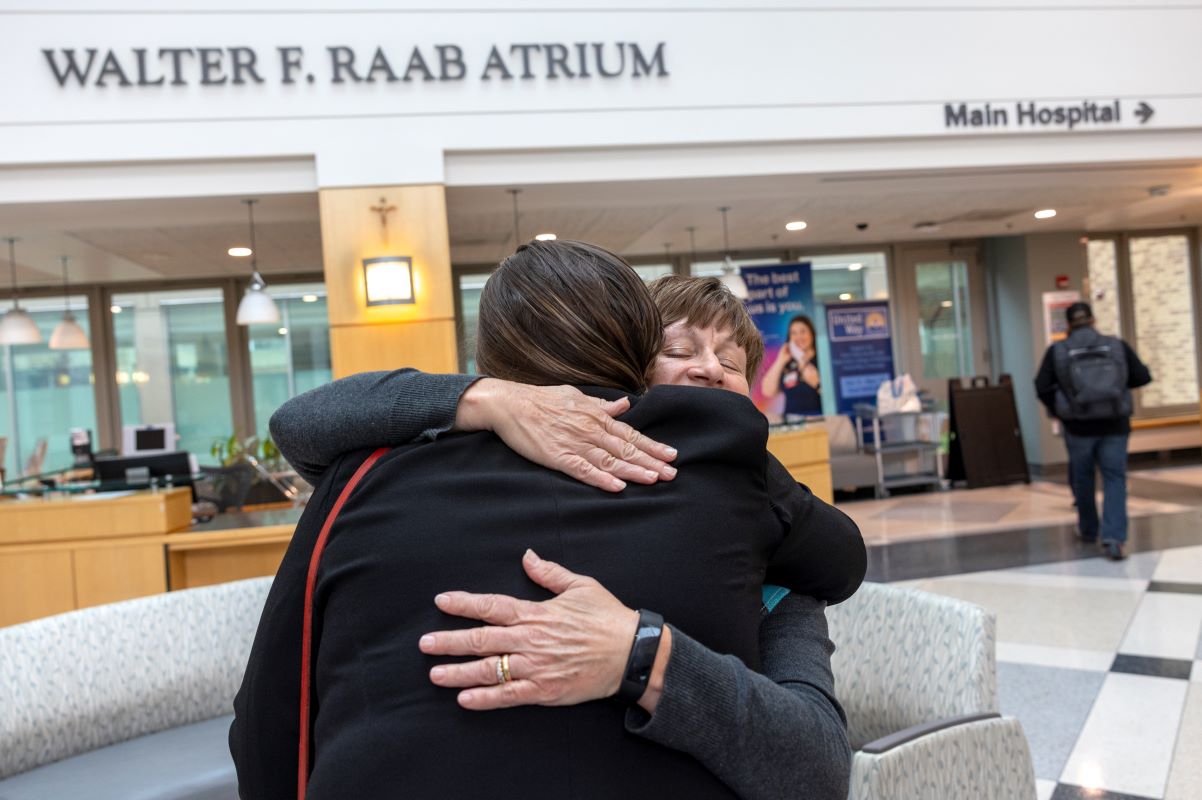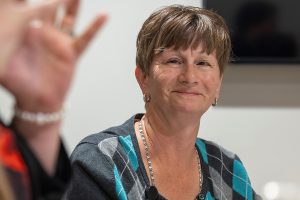Celebrating second chances: Holy Spirit Medical Center Maternal Assistance Program helps pregnant women on recovery journey

Chrystal keeps a box with all her important documents – tax information, insurance, medical papers. One paper speaks directly to who she is today. The graduation certificate from the Maternal Assistance Program (MAP) at Holy Spirit Hospital is a reminder of her hard work to overcome substance abuse and deliver a healthy baby. That certificate represents her journey to become a great mom, successful professional and significant contributor to her community.
Many people supported her, but she is quick to credit one specific person and program. Nearly 13 years ago, Deniene Dove, a Holy Spirit Medical Center MAP case manager, connected with her young client Chrystal for the first time. They recently met for a reunion of sorts ― a celebration of second chances, wellness and healing.
Standing in the Holy Spirit Medical Center lobby, the two reconnected instantly and shared a hearty hug. There were no awkward silences, just big smiles and an easy conversation. Chrystal was outgoing, bubbly and eager to share. Dove, more reserved, spoke with her eyes, which are warm, gentle and thoughtful.
“I feel so grateful for this opportunity to reconnect like this,” Dove said. “It happens so rarely that a person goes from being a patient to becoming a colleague.”
As they sat side by side, time melted away, and the same trust and respect that served as the foundation of their partnership years ago was evident once again.
Every possible support
The 30-year-old MAP program provides expectant and postpartum mothers battling addiction with the resources needed to ensure their babies have a healthy start in life. MAP launched in 1994, when Joyce Zandieh, a registered nurse administrator at Holy Spirit Hospital, realized that pregnant women and new mothers dealing with addiction had scarce support to give their babies a fighting chance to survive.
Rebuilding awareness
MAP staff are still rebuilding awareness of the program after the pandemic, which hurt outreach efforts. Referrals declined, and relapses increased due to isolation and stress. But there is no slowing down as the team advances the mission to save babies and help moms start over and live healthy, fulfilling lives.
The National Perinatal Association has recognized MAP as a model program. Questions and referrals can be sent to MAP@pennstatehealth.psu.edu, or call 717-763-3008.
MAP’s priority, then and now, is to save babies by getting their moms every possible resource they need to stop using drugs and alcohol and live safer and healthier lives. This includes accessing insurance, drug and alcohol services, mental health treatment, parenting classes, transportation, car seats, diapers, formula and other baby items.
Now a part of Penn State Health Holy Spirit Medical Center’s Behavioral Health Department, the program has a contract with the Cumberland-Perry Drug & Alcohol Commission, with funding from the Pennsylvania Department of Drug and Alcohol Programs. The MAP team serves clients in Cumberland, Dauphin, Lebanon and Perry counties.
Chrystal was one of those clients. Pregnant at age 18, she found herself at a crossroads. She was addicted to opiates and alcohol and was moving in and out of treatment programs. During a visit to her OB-GYN, Chrystal’s blood work showed the presence of opiates. Her doctor made a referral to MAP.
“I didn’t understand the power of addiction,” Chrystal said. “Logically, I wanted to stop using to protect my baby, but physically I couldn’t. Transparency is critical to getting well, but there’s so much shame and guilt.”
Dove visited Chrystal at her mom’s home when she was six months pregnant. Crystal was skeptical and had trust issues. “Addiction wants you to be isolated and put walls up,” Chrystal said.
Strength-based therapy
Dove, who has been a MAP case worker for 20 years, said she uses a strength-based approach to connect with clients. She meets them where they are comfortable and works from their strengths.
“She put me at ease and was kind and that really opens a door,” Chrystal said. “She sincerely wanted my baby to be as healthy as possible.”
And she was.
“When my daughter was born I knew I would do anything to protect her and keep her safe, but I was scared,” Chrystal shared.
She remained with MAP and Dove until her baby was six months old. Today, moms have the option to stay until their child is 2 years old.
Chrystal’s recovery journey has not been linear. With the right support and resources, she remains healthy and stable, attributing success to Dove and all the seeds MAP planted for her future. After two years of sobriety, she began work in the addiction field and has continued, advocating and teaching for numerous drug and alcohol treatment and advocacy organizations.
A case manager’s journey
When Dove reflects on her journey as a MAP case manager, she considers why so many of her clients succeeded. “If you get past their fear of being reported to the police and establish trust, there is a very good chance for progress and success,” she says. If a client relapses, MAP allows them back in the program.
Case managers often face burnout. Dove says the Holy Spirit Behavioral Health Department provides resources to help them through the tough times. Her supervisor Scotte Thomas can sense when his staff need extra support. That approach helps with retention in a tough job.
“I break down sometimes” Dove said. “I can’t control everything. I latch on to client satisfaction surveys and take pride in knowing they were happy. My priority is to protect the baby and help the mom get to a better, more stable place in her life.”
Colleagues with a shared mission
Chrystal and Dove share their professional experiences working in the addiction field, a common ground that is rare.
Dove’s pride is evident. “I’m so happy for you on your journey,” she tells Chrystal, “all that you have done, all the places you have worked.”
“The worst things in my life have taken me to my best places,” Chrystal said. “You told me I wasn’t alone, and I was worthy of recovery and a beautiful life. You got me in a place to feel I could move forward.”
Chrystal shifts to family, showing Dove photos of her daughter and their new puppy. The ordinary is extraordinary in Chrystal’s eyes. She tells Dove how she gets to pick her daughter from school, like all of the – what she calls – “normal moms.”
“MAP’s support allowed me to flourish into the really good mom I am today,” Chrystal said.
“Hearing that makes my job worthwhile,” Dove said.
If you're having trouble accessing this content, or would like it in another format, please email the Penn State College of Medicine web department.

